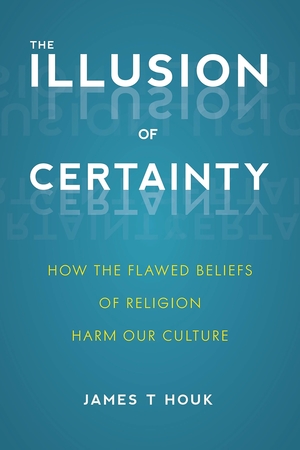10,000 religions. Can they all be wrong? Can any be right? Well, certain members of all of them believe they are. The result is a world pushed this way and that. Separation and conflict ensues.
James T. Houk is a professor of anthropology at Our lady of the Lake College in Baton Rouge Louisiana. Anthropology is the study of human culture in all its aspects, and religion is embedded in every culture on Earth. Ergo, professor Houk is well qualified to write about religion and its effects on societies, and he does it clearly and well.
The first lesson is that all religions are local. They are adaptations suitable for a specific location and generally don’t spread far from their origins. Those that do are spread through colonialism and/or conquest: notably, Christianity and Islam.
The second lesson is that none of religion’s tenets are ‘falsifiable.’ In other words, there is no way to test their truth claims and, therefore, cannot be proven or disproven. So, they will be with us until humanity outgrows them altogether or one wins out and belief is universal.
[alert variation=”alert-info”]Publisher: Prometheus Books
Formats: Paperback, eBook, Kindle
Purchase: Powell’s | Amazon | iBooks[/alert]
Most of the book is a compendium of reasons to distrust religions, pointing out logical fallacies and problems with factual claims due to the fact that no scripture presents knowledge newer than 2,000 years old.
So how does it continue, in the face of such withering exposure to doubt? Indoctrination. Religious instruction is started early and reinforced throughout a person’s childhood and, therefore, has an advantage over competing ideas. This reviewer suggests that it should be against the law to send children to church before their age of majority. Particularly when combined with Pizza.
In any case, Prof. Houk has provided a very competent overview of objections to all aspects of the Abrahamic Religions, which hold sway over much of Europe, America, and the Middle East. The subject is well covered with, for the most part, lucid and readable prose. It can’t help but lessen the damage that illusions of certainty propagate.
For further reading that supports the author’s presentation, I recommend: Atheism: The Case Against God by George H Smith and Cows, Pigs, Wars and Witches: The Riddles of Culture by Marvin Harris.
And finally, A quote from Mark Twain: “It ain’t what you don’t know that gets you into trouble, it’s what you know for sure that just ain’t so.”
[signoff predefined=”Social Media Reminder” icon=”twitter”][/signoff]

